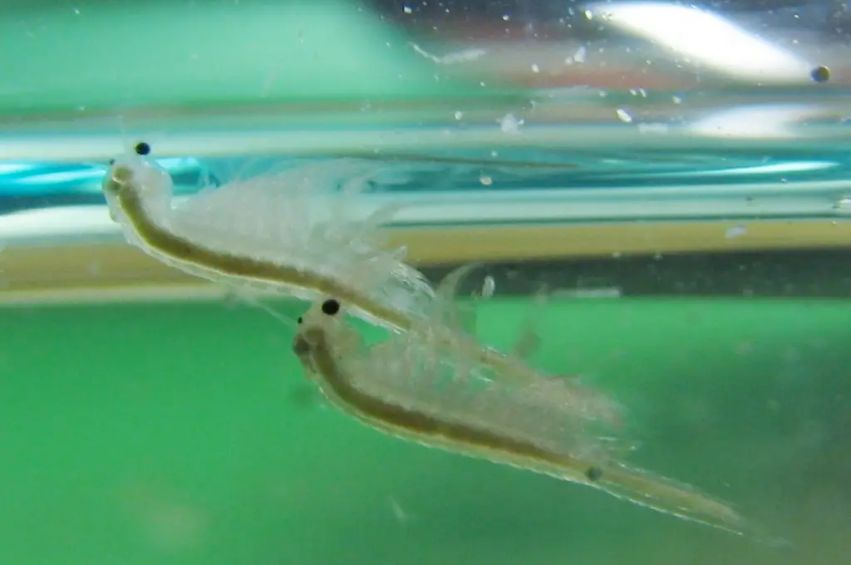While Sea Monkeys may be intriguing, they are not typically eaten by humans due to their minuscule size and lack of substantial meat. They are better appreciated as a curiosity rather than a culinary option.
Could those tiny, intriguing creatures known as Sea Monkeys find their way onto your plate? Let’s explore the edibility of Sea Monkeys and delve into a world of culinary possibilities.
Can You Eat Sea Monkeys?
Yes, Sea Monkeys are safe to eat as they are typically brine shrimp that have been dehydrated. Sea Monkeys are a brand name for brine shrimp sold as live eggs and then hatched and kept in an aquarium.
Once fully grown, the brine shrimp can be harvested and consumed, either alive or cooked.
However, it’s worth noting that Sea Monkeys are not typically eaten as a main course but as a novelty item or as a supplement to other foods.
It’s always best to consult with a healthcare professional or nutritionist before consuming any new food or supplement to ensure it fits within your dietary needs and restrictions.
Nutritional Value Sea Monkeys
When it comes to nutritional value, Sea Monkeys have some impressive qualities. Here’s a breakdown of their nutritional content:
- Protein: Brine shrimp boast a protein content of up to 70%, making them an excellent source of this essential nutrient.
- Vitamins and Minerals: Sea Monkeys contain vitamin A, vitamin C, vitamin B12, calcium, iron, and phosphorus, among others.
- Omega-3 Fatty Acids: These tiny creatures also offer a good supply of omega-3 fatty acids, known for their heart-healthy benefits.
Considering Ethical Implications
While Sea Monkeys are safe for human consumption, it’s essential to consider the ethical implications before including them in your diet. Here are some points to ponder:
- Sustainable Farming Practices: Choose Sea Monkey products that are sustainably sourced and produced through ethical farming practices.
- Maintaining Sea Monkey Populations: Remember that removing brine shrimp from their natural habitat can impact marine ecosystems. Select reputable sources that prioritize responsible breeding and population management.
Recipes And Ideas
Here are a few more recipe suggestions to ignite your culinary creativity:
- Sea Monkey Stir-Fry with Asian flavors and crunchy vegetables.
- Sea Monkey Stuffed Mushrooms for an elegant appetizer.
- Sea Monkey Pasta with garlic, olive oil, and grated Parmesan.
Exciting Flavor Combinations
Are you curious about flavor pairings that enhance the unique taste of Sea Monkeys? Consider these combinations to elevate your dishes:
- Lemon and Herbs: Brighten the delicate flavor of brine shrimp with a squeeze of fresh lemon juice and a sprinkle of herbs like dill or parsley.
- Spices and Citrus: Add depth to Sea Monkey dishes with spices such as paprika, cayenne pepper, and a hint of tang from lime or orange zest.
Now that you know Sea Monkeys can be enjoyed as part of your culinary exploration, feel free to get creative and discover new ways to incorporate these fascinating little creatures into your meals.

Risks And Precautions When Consuming Sea Monkeys
Consuming Sea Monkeys involves risks and precautions. It’s important to note that Sea Monkeys are not meant to be eaten and could be potentially harmful if ingested.
It is recommended to exercise caution and proper research before considering the consumption of Sea Monkeys.
Sea Monkeys, also known as brine shrimp, are often considered just pets to observe and enjoy in their miniature aquatic world.
However, some wonder if they can take their relationship with Sea Monkeys to another level and consume them as food.
While it is possible to eat Sea Monkeys, specific risks and precautions must be considered before indulging in this unique culinary experience.
Health Risks And Allergies
Consuming Sea Monkeys may pose certain health risks and potential allergies for specific individuals. Here are some crucial points to keep in mind:
- Sea Monkeys are crustaceans, and individuals with shellfish allergies may experience adverse reactions if consumed.
- Sea Monkeys are not subject to the same rigorous health and safety regulations as conventional seafood, so there is a heightened risk of contamination or bacterial infection.
Potential Hazards
Before diving into a plate of Sea Monkeys, it is crucial to be aware of some potential hazards associated with their consumption:
- Sea Monkeys are typically sold as “instant pets.” They are often found in kits that contain artificial growth hormones and chemicals. Ingesting these substances could be harmful to one’s health.
- Some brine shrimp species are known to accumulate toxins from their surrounding environment, which could have adverse effects if consumed.
Safety Precautions To Take
Ensuring the security and pleasure of your Sea Monkey dining experience: Make sure your Sea Monkey dining experience is both secure and enjoyable; these safety guidelines must be adhered to:
- If you have any known allergies to seafood or shellfish, it is strongly advised to abstain from consuming Sea Monkeys.
- Ensure that the Sea Monkeys you plan to consume are from a reliable and reputable source. It is crucial to verify that they have been harvested and processed in a safe and sanitary manner.
- Cook the Sea Monkeys thoroughly before consuming them. This process helps eliminate any potential bacteria or parasites that may be present.
Responsible Sea Monkey Consumption
Engaging in responsible Sea Monkey consumption involves considering not only the potential risks and safety precautions but also the ethical and sustainable aspects of their harvesting:
- Ensuring that the Sea Monkeys have been ethically and sustainably harvested is essential. Look for companies or suppliers that follow responsible fishing practices to minimize adverse environmental impacts.
- Prioritize supporting brands and businesses that adhere to sustainable sourcing practices to prevent overfishing or depletion of natural resources.
- Familiarize yourself with local laws or regulations regarding harvesting and consuming Sea Monkeys. It is essential to respect and adhere to these guidelines.
Should You Try Eating Sea Monkeys?
Sea Monkeys, the popular novelty pets, may not be a culinary delight. Eating Sea Monkeys is not recommended due to their small size and high iodine content.
Exploring The Pros And Cons
Eating Sea Monkeys may sound like a peculiar idea. Still, it has become a topic of curiosity among adventurous food enthusiasts. Before jumping in, it is essential to weigh the pros and cons.
Here, we will delve into the benefits and drawbacks of consuming Sea Monkeys, including personal experiences and testimonials.
By the end, you will be equipped to decide whether or not to try this unusual and potentially tasty delicacy.
Benefits And Drawbacks Of Eating Sea Monkeys:
**Pros**:
- Sustainable food source: Sea Monkeys are known for their rapid reproduction rate and minimal environmental impact, making them an eco-friendly food option.
- Nutritional value: These tiny crustaceans are rich in protein, vitamins, and minerals, contributing to a healthy diet.
- Unique flavor profile: Sea Monkeys offer a distinctive taste, often subtly salty, briny, and reminiscent of seafood.
**Cons**:
- Ethical concerns: Some individuals may have reservations about consuming live organisms, raising ethical considerations.
- Allergic reactions: As with any food, there is a risk of allergic reactions to Sea Monkeys, although such cases are rare.
- Limited availability: Unless you cultivate your own Sea Monkeys, finding them on restaurant menus or grocery store shelves might prove challenging.
Personal Experiences And Testimonials:
While personal experiences with eating Sea Monkeys may vary, many individuals delight in this unconventional dining experience.
Some adventurous food enthusiasts have enjoyed the unique flavor and texture, often comparing the taste to shrimp or brine shrimp.
These tiny organisms can also be incorporated into various recipes, adding a twist to familiar dishes.
However, it is essential to note that not all experiences are positive. Some individuals might find the concept distasteful, while the sensation of consuming live organisms may put others off.
Ultimately, personal preference
Frequently Asked Questions
Can Sea Monkeys Be Used As Food?
No, sea monkeys are not suitable for consumption as food.
Do Sea Monkeys Give Live Birth?
Yes, sea monkeys do give live birth.
How Big Can Sea Monkeys Get?
Sea monkeys can grow up to 1 inch in size, making them small and fascinating aquatic pets.
How Long Do Sea Monkeys Last?
Sea monkeys typically have a lifespan of around 1 year if they are looked after properly.




